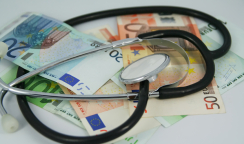Doctors know little about female bodies: report
 Doctors do not know enough about the differences between male and female bodies, leading to wrong diagnoses, failed treatments and higher costs, according to a report to be presented to health minister Edith Schippers on Tuesday.
Doctors do not know enough about the differences between male and female bodies, leading to wrong diagnoses, failed treatments and higher costs, according to a report to be presented to health minister Edith Schippers on Tuesday.
The report is an initiative from the Alliance Gender and Health, set up in 2014 by the women’s network Women Inc. The information in the report was gathered by ZonMVV, an institute which stimulates and finances research into health care and a group of experts. It has the support of the health ministry.
The report includes figures from the central statistics agency CBS, the national compass on public health NKV and the emancipation monitor 2014.
There are few positives in women’s health, according to the report. They live 3.6 years longer than men, are half as likely to be addicted to medicines and around a quarter less likely to die of cancer.
However, women face chronic illness six years earlier than men and experience physical limitations six months earlier. When figures are adjusted for pregnancy, the number of hospital stays for women is 10% higher than for men.
Women visit their GP more often and take more medicines. And these medicines are usually tested on healthy men, leading to more side effects in women. It is more difficult to test medicines on women because of the hormone changes during their menstrual cycle, experts say.
High costs
Among the other examples in the report are that women suffer twice as often from migraine, high blood pressure and wear and tear on knees and hips. They are also five times more likely to face violence from a partner.
All of this leads to higher costs in health care, with 55.2% of the total being spent on women.
Women Inc hopes the report will convince Schippers to set up a national programme gender and health, with a first aim of encouraging doctors to use the information in their treatment of men and women.
Thank you for donating to DutchNews.nl.
We could not provide the Dutch News service, and keep it free of charge, without the generous support of our readers. Your donations allow us to report on issues you tell us matter, and provide you with a summary of the most important Dutch news each day.
Make a donation